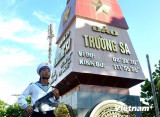Order in East Sea should be built on basis of 1982 UNCLOS: int’l conference
Experts at the 13th South China Sea International Conference on November 19 shared the view on the significance of building order in the East Sea (internationally known as South China Sea) based on international law, especially the 1982 United Nations on the Law of the Sea (1982 UNCLOS).
They pointed out complex developments in the East Sea and the region over the past time, which have drawn public concern.
Many said the ruling issued by the Permanent Court of Arbitration in 2016 plays an important role in narrowing disputes in East Sea, and clarifying the legal grounds for some issues in the waters such as oil and gas activities, the determination of baselines for features in the East Sea, and ensuring safety and security of navigation in the region.
Others said the battle of diplomatic notes between countries regarding the East Sea show that the majority back the use of the UNCLOS as the only and comprehensive legal basis for determining maritime claims and exercising the sovereign rights and jurisdiction of states.
The scholars emphasised factors that cause supply chain disruptions, rising costs and labour shortage; and discussed solutions to restore the sea route in the coming time.
They also stressed importance of marine science research and sea environment protection as well as the use of technologies for peaceful purposes.
Dr. Pham Lan Dung, Acting Director of the Diplomatic Academy of Vietnam, said proposals raised at the conference will contribute to improving public awareness of maintaining cooperation and peace in the East Sea in the context of the world facing difficulties caused by COVID-19 and each person striving to adapt to the new normal.
The conference, held in both online and in-person forms, brought together more than 60 scholars from 30 countries and territories, 90 representatives from diplomatic corps, and nearly 500 delegates./.
VNA
Project on expansion, establishment of marine protected areas approved
Vietnam Coast Guard vessel visits Philippines
 Vietnam attends 14th annual East Sea conference in US
Vietnam attends 14th annual East Sea conference in US
 Delegation visits Truong Sa island district, platform
Delegation visits Truong Sa island district, platform
 Overseas Vietnamese visit Truong Sa, DKI platform
Overseas Vietnamese visit Truong Sa, DKI platform
 Vietnam, China coast guards finish joint patrol
Vietnam, China coast guards finish joint patrol
 All activities in East Sea must comply with int’l law: deputy spokesperson
All activities in East Sea must comply with int’l law: deputy spokesperson
 Vietnam resolutely refutes illegal claims in East Sea: Spokeswoman
Vietnam resolutely refutes illegal claims in East Sea: Spokeswoman
 Vietnam deeply concerned about recent tension in East Sea: Spokeswoman
Vietnam deeply concerned about recent tension in East Sea: Spokeswoman
 DK1 platform stands firm on the wave front
DK1 platform stands firm on the wave front



